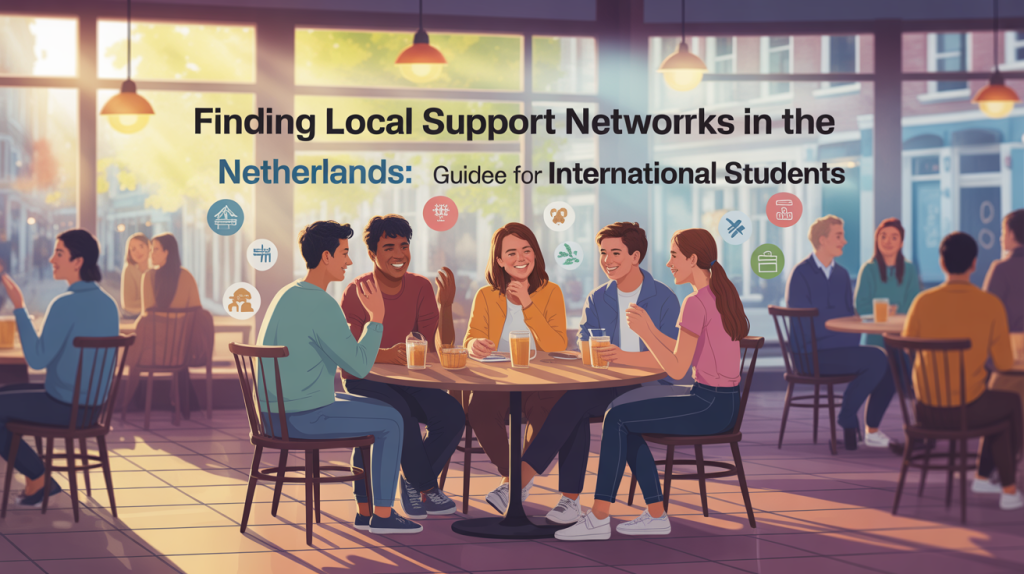Finding Local Support Networks in the Netherlands: A Guide for International Students
Types of Support Networks Available
Specialized Support for International Students
Practical Steps to Building Your Local Social Network
Support for Students with Specific Needs
How Study in Netherlands Supports Your Journey
Conclusion
Understanding the Dutch Social Support Act (Wet maatschappelijke ondersteuning – Wmo)
A cornerstone of the Netherlands’ local support system is the Social Support Act (Wmo). This legislation obliges Dutch municipalities to provide social support for residents facing difficulties in daily functioning, particularly those unable to depend solely on informal help from their social circles.
Key Features of the Social Support Act
- Municipal Responsibility: Each municipality tailors its support services, ensuring localized and relevant assistance aligned with community needs.
- Compensatory Approach: The act mandates municipalities to “compensate” individuals struggling with daily life management or social participation, ensuring no one is left unsupported.
- Range of Services: Support can include help with household tasks, mobility aids, counseling, and community engagement programs.
Research focusing on cities such as Breda has demonstrated that people experiencing daily limitations are more likely to receive municipal social support services. This localized administration allows students residing in various Dutch cities to access support relevant to their specific contexts.
Types of Support Networks Available for International Students
Building a robust local support network involves understanding both formal and informal avenues of assistance.
Formal Support Systems
- Social Work Services: Assistance with integrating into the community or managing personal challenges.
- Healthcare Referrals: Access to specialized care when needed.
- Counseling and Mental Health Services: Support tailored for emotional well-being.
International students with specific needs or disabilities can approach their municipal offices to inquire about tailored support services. Understanding the local municipality’s offerings helps students proactively address potential challenges.
Informal Support Networks
- Family and Friends: While help from family and friends is crucial, studies indicate that it does not reduce the need for formal municipal support, highlighting the importance of both support types.
- Neighbors: Informal neighborly help has been shown to decrease the likelihood of using formal municipal services, underscoring the value of local community relationships.
For international students new to the Netherlands, building informal support—through friendships, peer connections, and community participation—is vital for social well-being and reduces dependence on formal support services.
Specialized Support for International Students and Newcomers
The Netherlands offers specialized support services targeting newcomers, including asylum-seekers and refugees, aligning closely with the needs of international students.
- Educational Support: Several organizations and municipal programs assist newcomers in understanding the education system, enrolling in courses, and accessing language training.
- Integration Programs: Activities focused on cultural orientation, networking, and community engagement help students and newcomers integrate comfortably.
Understanding these specialized supports enables university admissions teams and recruitment agencies to provide better guidance and tailor their services to individual student needs.
Practical Steps to Building Your Local Social Network
Establishing a strong local network is a strategic priority for international students. Research within Dutch neighborhoods emphasizes that personal social networks are critical resources, especially in urban settings.
How to Build Your Network
- Participate in Community Events: Attend local cultural festivals, public discussions, and workshops.
- Join Student Associations: University clubs and international student organizations offer platforms to meet peers from various backgrounds.
- Engage with Neighbors: Simple gestures like greetings and shared activities foster trust and informal support.
- Utilize University Resources: Many Dutch universities provide mentorship programs and buddy systems for newly arrived international students.
Active engagement not only strengthens social ties but also enhances academic motivation and mental health.
Support for Students with Specific Needs
Approximately 15% of the Dutch adult population receives assistance related to illness or disability, reflecting a widespread acceptance and encouragement to seek support.
Tailored Assistance Through the Dutch System
The Dutch health and social care systems focus on enabling recovery and well-being via targeted programs. For example, initiatives like the HOP-TR (Health Of Persons in Transition Research) reveal insights into how to support vulnerable individuals effectively.
International students facing specific physical, mental, or social challenges can leverage these specialized services. Coordinating with university counseling centers and local municipal offices ensures comprehensive care tailored to individual circumstances.
How Study in Netherlands Supports Your Journey
At Study in Netherlands, we recognize that academic success is deeply intertwined with social and emotional well-being. We support universities, recruiters, and student placement agencies by providing:
- Expert Guidance on Student Well-Being: Helping partners understand the Dutch social support context.
- Recruitment Solutions Connecting Students to Support Networks: Ensuring students receive complete information to access available services.
- Collaborative Opportunities for Education Professionals: Enhancing engagement strategies with international students.
By leveraging our knowledge and technology, stakeholders can foster environments where international students thrive academically and personally.
Conclusion: Take the Next Step Toward Successful Integration
Navigating life as an international student in the Netherlands is facilitated by understanding and utilizing local support networks. Both formal municipal services and informal community connections play integral roles in ensuring student well-being and success.
Whether you are an educational recruiter, university admissions professional, or part of a student placement agency, incorporating knowledge of Dutch support systems into your guidance enables better student experiences and outcomes.
Take the Next Step with Study in Netherlands
Ready to enhance your international recruitment and student support strategies? Explore further to find resources tailored for education professionals.

